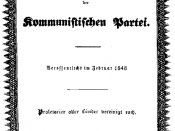Karl Marx was one of the most influential idealogues of the 19th and 20th centuries. His seminal document The Communist Manifesto of 1847 was the first of its kind to expound the communist philosophy. Karl Marx's communism was a synthesis of the ideas and actions that had evolved since the Enlightenment, the French Revolutions, and the Industrial Revolution. The Communist Manifesto encompassed a large field of influences including but not limited to socialism, classical economics, evolution and revolution.
Socialism emerged as a response to the Industrial Revolution. It was a form of class consciousness, an attempt to offer viable remedies to the deplorable and soulless existence of the vast majority of Europe, the proletariat. It was more or less the idea that society should be organized for the benefit of the community not individuals. Socialism sought progressive reform, promoting government intervention and relief programs, democratic bureaucracies, and associations of free individuals.
Marx was influenced particularly by French socialism, which had evolved from France's first and second Revolutions, with the ideas of property redistribution, and the evils and exploitations of capitalism and laissez-faire economics.
Utopian socialists Robert Owen and Charles Fourier advocated egalitarian communities governed by principles of cooperation in which individuals would work "for", and not "by" each other. (Aspects, p. 194) Fourier claimed that history moved in cycles towards a more perfect future, an idea that was carried by another utopian socialist, Henri de Saint-Simon. Saint-Simon's concept that society develops in stages held considerable sway in Marx's own conceptions of historical progression.
Karl Marx considered himself a Hegelian in his days at university, meaning a follower of Prussian philosopher Georg Hegel, whose theory of history as an inevitable development of dialectical stages gave birth to Marx's own theory of dialectical materialism. To expound briefly: dialectical materialism states that...


